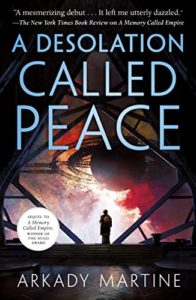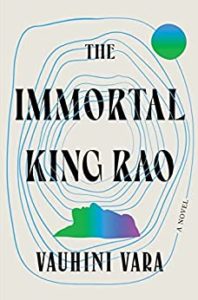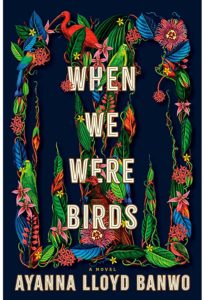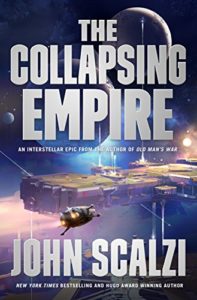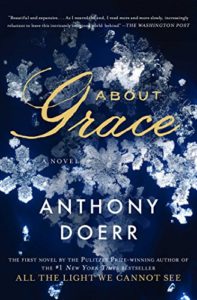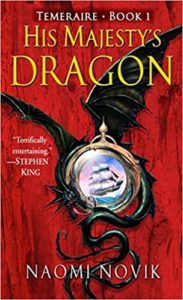Favorite Speculative Novels of 2022
If you’re looking for last-minute holiday gift ideas — or amassing a list for yourself to start off the coming New Year — here are my favorite novels of 2022. Some are newly published, some are just new to me, and all have some sort of fantastical or science fiction element.
(If you’re looking for quicker reads, check out the post on my Favorite Short Fiction of 2022.)
When We Were Birds
by Ayanna Lloyd Banwo
This was the most beautiful and satisfying novel I read this year. Part ghost story, part love story, When We Were Birds follows two characters through the fantastically tinged city of St. Bernard, Trinidad.
Yejide is a young woman about to inherit a magical legacy passed down through the women in her family—the responsibility to shepherd the city’s souls into the afterlife. But it’s a burden she doesn’t want. Darwin is a poor young man struggling to earn money to support his mother. Yet the only job available to him – that of a gravedigger – goes against his Rastafarian vows.
While some love stories concentrate on the courtship and struggles of a new couple, I loved how this novel took a different route, alternating between each character and their individual problems with family and faith that put lives (and souls) at risk. It’s through these problems that they meet and ultimately see how the other can be a source of strength as they stand together against violence, apathy and corruption.
The biggest surprise of the novel was that, although I bought the book because I was interested in Yejide’s supernatural heritage, I ended up being most fascinated by how Darwin grappled with both his beliefs and doubts within the very real Rastafari religion. It’s a tradition I didn’t know much about, and I was inspired by how he balanced being true to himself with still honoring the values by which his mother raised him.
The Employees
by Olga Ravin
If you want to read something short and strange with a touch of dark, biting humor, you’ll like this creepy novel about a group of employees aboard a starship that takes on a series of mysterious objects.
The story is told as a series of memos and corporate interviews of the crew, which include both humans and android-like humanoids. Little is explained about the mysterious objects, which were retrieved from the planet the ship orbits, except that the crew members have become obsessed with them. They become increasingly distraught even as their corporate interviewers remain focused on preserving worker productivity.
I was most riveted by the relationship between the humans and non-humans in the novel– the initial affection, the growing resentment and violence, the heartbreaking anxiety of humanoids who increasingly feel too human, and the humans who increasingly feel detached and unreal.
Although this slim novel is sometimes confounding, it’s purposely so, in a sci-fi/horror-fun-house sort of way. What’s happening? Who’s really in charge? What does “real” even mean? The twist ending makes everything dreadfully clear.
A Desolation Called Peace
by Arkady Martine
A sequel to the much-lauded A Memory Called Empire, this novel delves deeper into the Aztec-and-Byzantium-inspired Teixcalaan Empire and delivers a satisfying space opera experience even more accessible than the first installment.
I loved the first novel for its political intrigue, spycraft and wonky linguistic/cultural world-building. But what probably stayed with me the most was the author’s insightful and nuanced depiction of colonialism in space – an empire that changes everything it touches with its wealth and power, an empire that is both impressive, vicious and culturally insidious.
In this second book, the previously vague-but-growing alien threat takes center stage, featuring a terrifying species that considers all humans merely “clever meat.” Lsel station diplomat Dazmare Mahit and Imperial official Three Seagrass are together again (with sparks continuing to fly) as they figure out how to communicate with a seemingly more ruthless enemy that has no concept of language. Author Arkady Martine’s brilliant solution lands solidly into the “surprising yet inevitable” category and offers beautiful-but-understated commentary on the themes of shared consciousness and humanity.
The Immortal King Rao
by Vauhini Vara
A mix of historical family epic and near-future dystopia, the Immortal King Rao tells the story of the son of a poor Indian coconut farmer who becomes the world’s most powerful man, ushering in a world run by a single tech corporation as the climate collapses.
Three separate timelines are woven into one as we trace events through the eyes of Rao’s daughter, Athena, who has been arrested for his murder. Through her father’s own invention, she retains all his memories and conveys them as we wonder: Did she really do it? (And, either way, did he deserve it?)
The biggest surprise of the novel for me was how, on the conceptual level, it was an exploration of various economic and political systems: from a family-run farm in 1950s, post-colonial India to university life in the capitalist United States to a future run by an all-seeing, all-knowing global tech monopoly that uses a social credit system much like today’s Chinese Communist party. That Big Bro is happily embraced by the whole world, except for a small anarchist group hobbled by its own isolation, struck me as particularly prescient. Each system is presented in a nuanced way, showing both its advantages and pitfalls and (most fascinating to me) how all of them are in response/reaction to one another.
I wish I saw more of this sort of discussion in the world – less “pro” or “con” of one particular political ideal, and more recognition of how weaknesses and imbalances in all of them (caring only about the collective, only about the individual or only about profit) have dire consequences. This novel made me think harder about the kind of world we live in, where we’re headed and where we’d rather be going.
The Collapsing Empire
By John Scalzi
I had a list of other books I was supposed to finish this year when my husband handed me a paperback and said, “You should really read this. It’s Games of Thrones in space.” I didn’t have time to take on any more novels, so I just thought I’d give the first page a little peek.
That “peek” turned into me devouring the novel in three days. And then loving it so much I finished the entire trilogy (called The Interdependency) in another two weeks. In a nutshell, this series is ridiculously fun with the bonus of some seriously bad-ass female characters bent on saving and/or destroying their corner of the galaxy as the main mode of travel and trade between planets breaks down, threatening to starve billions.
You know those awful cliches—the ones about a book that “keeps you on the edge of your seat” and is “laugh-out-loud funny”? Well, I’m sorry, but cliches exist for a reason. Go read this book.
About Grace
By Anthony Doerr
Before Doerr wrote the Pulitzer-Prize winning All the Light We Cannot See, he wrote About Grace. It’s a novel about a man with the “gift” of premonitions who dreams his young daughter will die in a flood. To stop the dream from coming true, he abandons the family he loves and flees to the Caribbean. There, he is plagued by guilt and doubts about his sanity, eschewing his career as a hydrologist for hard labor on an Antilles resort –until one day he is drawn back to see what his choice has wrought.
As with most of Doerr’s fiction, the author’s love of the natural world is ever-present in his characters and the achingly beautiful specificity of his description—of jellyfish “flexing in the sand like strange translucent lungs,” sunset skies “more like drugs than colors,” of air that tastes of “burning garbage.”
This novel is more intimate than Doerr’s Pulitzer-winning novel, so in a strange way it felt more real to me despite its fantastical premise and that fact that All the Light is based on history. And although the ending was a tad nebulous, I know I’ll be reading it again just to feel the desperate longing of his characters and to float in the sea of his lyrical prose.
His Majesty’s Dragon
by Naomi Novak
I like to tackle at least one “classic” fantasy tale each year, and His Majesty’s Dragon was a delightful choice. The first in an alternative history series about the Napoleonic Wars, the book features an entertaining mix of aerial warfare adventure and British snobbery. But the main dish being served is the budding relationship between Capt. William Laurence and the intelligent, talking dragon he comes to ride into battle, Temeraire.
That the novel partially addressed one of my top SFF pet peeves – Why the heck do so many dragons listen to humans and let us ride them in the first place? Why don’t we do their bidding? – was a particular highlight for me. And yes, some aspects of the book read as a little old fashioned but, hey, it’s set in 1804. As complicated as the world is right now, and despite my penchant for liking grey protagonists, I was shockingly relieved encounter a main character who I could root for because he was simply a good person.

